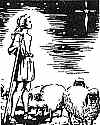|
In analyzing these imaginary riders we must remember they were the choice of one man. It is quite likely that you would select different ones. Peace will mean many different things depending on each individual's outlook and the degree to which he or she has been affected by this conflict. It is important that each of us pick our horsemen for Peace very carefully, because if they do not ride well, the ancient horsemen will surely return.  However let us examine the suggested riders for Peace. The first, Hope
- down through history man has constantly held fast to the hope that
someday men will learn to live together on this Earth in Peace and
contentment. This Hope will be reborn when peace comes again. As our
knowledge increases and we see more of what the Future can hold, we
naturally grow optimistic. But we must temper our optimism with realism
and that brings us to the second Horseman - Good Sense.
However let us examine the suggested riders for Peace. The first, Hope
- down through history man has constantly held fast to the hope that
someday men will learn to live together on this Earth in Peace and
contentment. This Hope will be reborn when peace comes again. As our
knowledge increases and we see more of what the Future can hold, we
naturally grow optimistic. But we must temper our optimism with realism
and that brings us to the second Horseman - Good Sense.Since the days of Washington, Jefferson and Benjamin Franklin we Americans have been firm believers in common sense. We established a government and a way of doing things that has made us the most powerful and prosperous Nation in the World. We should hold fast to the principle of common sense, which is a good mixture of Willingness to Work, Tolerance, Honesty and Thrift. With the coming of Peace we shall again be torn between Idealism and Realism. It is something like driving a car along a dangerous road - Common Sense is the steering wheel that can keep us from running off the road on either side. |








